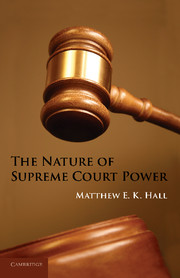Book contents
- Frontmatter
- Contents
- List of Figures
- List of Tables
- Preface
- 1 Neither Force, Nor Will
- 2 When Courts Command
- 3 Judging the Court
- 4 Popular Vertical Issues
- 5 Unpopular Vertical Issues
- 6 Popular Lateral Issues
- 7 Unpopular Lateral Issues
- 8 Neither the Sword nor the Purse, but the Keys
- Appendix I Case Selection
- Appendix II Survey Information and Citations
- Appendix III Supporting Data for Figures
- Appendix IV Statistical Analysis on the Effects of the Pico Ruling
- Appendix V Behavior Conformity Calculations
- Appendix VI Statistical Analysis of Behavior Conformity
- Appendix VII The Effects of Unanimity on Behavior Conformity
- Case References
- References
- Index
8 - Neither the Sword nor the Purse, but the Keys
Published online by Cambridge University Press: 06 December 2010
- Frontmatter
- Contents
- List of Figures
- List of Tables
- Preface
- 1 Neither Force, Nor Will
- 2 When Courts Command
- 3 Judging the Court
- 4 Popular Vertical Issues
- 5 Unpopular Vertical Issues
- 6 Popular Lateral Issues
- 7 Unpopular Lateral Issues
- 8 Neither the Sword nor the Purse, but the Keys
- Appendix I Case Selection
- Appendix II Survey Information and Citations
- Appendix III Supporting Data for Figures
- Appendix IV Statistical Analysis on the Effects of the Pico Ruling
- Appendix V Behavior Conformity Calculations
- Appendix VI Statistical Analysis of Behavior Conformity
- Appendix VII The Effects of Unanimity on Behavior Conformity
- Case References
- References
- Index
Summary
By a limited Constitution, I understand one which contains certain specified exceptions to the legislative authority; such, for instance, as that it shall pass no bills of attainder, no ex-post-facto laws, and the like. Limitations of this kind can be preserved in practice no other way than through the medium of courts of justice, whose duty it must be to declare all acts contrary to the manifest tenor of the Constitution void. Without this, all the reservations of particular rights or privileges would amount to nothing.
Alexander HamiltonIn this study, I have sought to identify conditions that influence the probability of the Supreme Court successfully exercising judicial power by causing the behavior of relevant actors to conform to its preferences as expressed in its rulings. My study has identified two factors that influence whether or not the Court successfully alters behavior through its rulings: the institutional position of those responsible for implementing the decision and the popularity of the decision. The Court tends to succeed at exercising power when it issues rulings in vertical issues (those in which lower courts can directly implement the decision) or popular rulings in lateral issues (all other issue areas); however, the Court tends to fail at exercising power when it issues unpopular rulings in lateral issues. Throughout the study, I have taken great care to avoid some of the methodological problems that have hampered previous examinations of Supreme Court power. I summarize my findings in Table 8.1.
- Type
- Chapter
- Information
- The Nature of Supreme Court Power , pp. 156 - 166Publisher: Cambridge University PressPrint publication year: 2010



